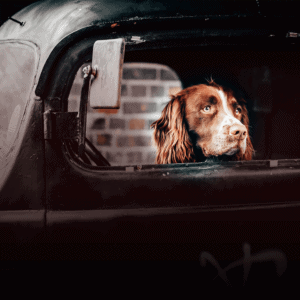A Guide To What Your Puppy Needs And When
Getting a puppy vaccinated is a landmark moment.
It means your pup can safely start playing with other dogs and you can start venturing outside of the house together for walks.
Immunity from nasty diseases doesn’t last forever though. So your puppy will need some booster shots to keep the vaccines up to date in the future.
This is why it’s important to know what vaccinations your puppy needs and when.
What vaccinations do puppies need?
Puppy vaccinations are specific to diseases and infections that can make dogs very ill.
Most dogs pick up these illnesses from saliva or faeces from other animals. Or by coming into contact with bad bacteria.
Anyone that has raised a puppy before will know just how curious they are. And how they like to eat whatever they find in front of them – no matter how disgusting it might be.
Unfortunately, this is how lots of puppies become unwell.
Vaccinations won’t stop this from happening. But getting your puppy vaccinated will protect him or her from catching some unpleasant diseases.
Here are the main diseases that the vaccinations protect against:
- Canine distemper – a virus that affects the respiratory, gastrointestinal and nervous system
- Canine parvovirus – a highly contagious virus that causes serious gastrointestinal illness in puppies
- Canine hepatitis – targets the blood vessels, kidneys, spleen, lungs and can cause long-term damage
- Kennel cough – an upper respiratory infection
- Leptospirosis – a zoonotic disease that causes a bacterial infection
- Parainfluenza – a highly contagious respiratory infection
Depending on where you are in the world, you might also want to get your puppy vaccinated against rabies or Lyme disease (a bacterial infection from a tick bite).
These are known as lifestyle vaccines and the risk level will depend on whether these diseases are active where you live.
For example, rabies is extremely rare in the UK so it’s not an essential vaccination for your puppy. But if you plan to travel abroad with your dog in the future, then it could be worth considering.
Whereas in the US, rabies vaccinations are required for all dogs. With recommendations that puppies be vaccinated against the virus at 14-weeks of age.
With Lyme disease, there is a higher risk if you live in a rural area where ticks thrive. In this case, the vaccination against Lyme disease is recommended.
Another good reason to get your dog vaccinated is that some diseases can be passed onto humans. These are known are zoonotic diseases.
To rule out the chance of this happening, and to protect your pooch and yourself, it’s best practice to get your puppy vaccinated.
When is the best time to vaccinate a puppy?
Most owners get their puppy vaccinated when they are between eight to 10 weeks of age.
This is also the age when people usually welcome a new puppy into their home, which makes vaccinations one of the first big responsibilities as a puppy parent.
The second dose is then typically given two to four weeks later but your puppy will not be fully immune for another two weeks.
However, it doesn’t always work out on this time scale.
For example, some puppies are vaccinated from as early as six to eight weeks. Or sometimes it’s later (although not recommended) – especially for rescue dogs.
Rescue puppies are usually vaccinated by vets at the shelter before being rehomed. This means the owner will only be responsible for making sure the pup gets the booster shots.
Typically, this happens at six to 12 months after the initial vaccination.
And at the same time as the booster shots are being administered, you can speak to your vet about keeping vaccines up to date as your puppy grows into an adult dog.
How much do vaccinations cost?
The cost of vaccinating your puppy will depend on the country and the area where you live. It will also be impacted by the decision to include lifestyle vaccines or not.
Here are some examples of the cost in different parts of the world:
- The average cost of puppy vaccinations in the US is between $75 to $100
- In the UK, the average cost of a puppy vaccination course is around £60
- In Australia, you can expect to pay between $170 to $250 for puppy vaccinations
If you have pet insurance some of these costs might be covered. But it will depend on your individual plan.
What happens if you don’t vaccinate a puppy?
There are reasons to not vaccinate a puppy, such as ethical concerns, the financial cost and the small chance of your pup having an adverse reaction.
If you don’t vaccinate your puppy though, there is a real risk of him or her catching a disease and becoming very ill. Not only would this result in huge vet bills, but it could lead to long-term health problems or even death.
Another consideration is if you want to go on holiday in the future and leave your dog at a kennel. Most kennels will only take dogs that have been fully vaccinated – and have the paperwork to prove it.
Likewise if travelling abroad with your dog is on the cards. In most cases, it will only be possible with a full record of vaccinations and booster shots.
Speak to your vet about four months before making any trips overseas to make sure all boosters are up to date.
Keeping your puppy healthy
Vaccinations might be costly and cause discomfort for your pup. But in the long run, they will protect your puppy’s health and save you money in vet bills.
In a nutshell, vaccinations are all about prevention. And we all know prevention is better than a cure.
After all, a healthy puppy is a happy puppy.
Want to know more about raising a puppy? Check out our essential guide to puppy care supplies.
Important Disclaimer – The information in this article is a general guide and general in nature and designed only to assist you in understanding the importance of puppy vaccinations and giving your puppy the best possible start in life.
It is not intended to be medical or veterinary advice and we strongly recommend that you should always consult your local veterinarian to obtain the best possible health information for your puppy.


















